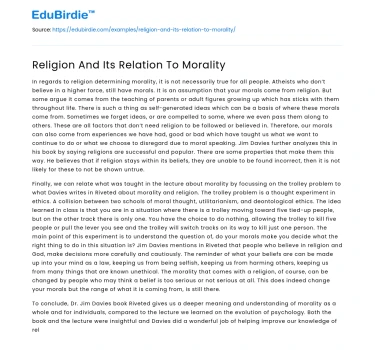In regards to religion determining morality, it is not necessarily true for all people. Atheists who don’t believe in a higher force, still have morals. It is an assumption that your morals come from religion. But some argue it comes from the teaching of parents or adult figures growing up which has sticks with them throughout life. There is such a thing as self-generated ideas which can be a basis of where these morals come from. Sometimes we forget ideas, or are compelled to some, where we even pass them along to others. These are all factors that don’t need religion to be followed or believed in. Therefore, our morals can also come from experiences we have had, good or bad which have taught us what we want to continue to do or what we choose to disregard due to moral speaking. Jim Davies further analyzes this in his book by saying religions are successful and popular. There are some properties that make them this way. He believes that if religion stays within its beliefs, they are unable to be found incorrect, then it is not likely for these to not be shown untrue.
Finally, we can relate what was taught in the lecture about morality by focussing on the trolley problem to what Davies writes in Riveted about morality and religion. The trolley problem is a thought experiment in ethics. A collision between two schools of moral thought, utilitarianism, and deontological ethics. The idea learned in class is that you are in a situation where there is a trolley moving toward five tied-up people, but on the other track there is only one. You have the choice to do nothing, allowing the trolley to kill five people or pull the lever you see and the trolley will switch tracks on its way to kill just one person. The main point of this experiment is to understand the question of, do your morals make you decide what the right thing to do in this situation is? Jim Davies mentions in Riveted that people who believe in religion and God, make decisions more carefully and cautiously. The reminder of what your beliefs are can be made up into your mind as a law, keeping us from being selfish, keeping us from harming others, keeping us from many things that are known unethical. The morality that comes with a religion, of course, can be changed by people who may think a belief is too serious or not serious at all. This does indeed change your morals but the range of what it is coming from, is still there.
Save your time!
We can take care of your essay
- Proper editing and formatting
- Free revision, title page, and bibliography
- Flexible prices and money-back guarantee
To conclude, Dr. Jim Davies book Riveted gives us a deeper meaning and understanding of morality as a whole and for individuals, compared to the lecture we learned on the evolution of psychology. Both the book and the lecture were insightful and Davies did a wonderful job of helping improve our knowledge of religion, and morality.
Did you like this example?
Make sure you submit a unique essay
Our writers will provide you with an essay sample written from scratch: any topic, any deadline, any instructions.
Cite this paper
-
APA
-
MLA
-
Harvard
-
Vancouver
Religion And Its Relation To Morality.
(2022, February 18). Edubirdie. Retrieved December 22, 2024, from https://edubirdie.com/examples/religion-and-its-relation-to-morality/
“Religion And Its Relation To Morality.” Edubirdie, 18 Feb. 2022, edubirdie.com/examples/religion-and-its-relation-to-morality/
Religion And Its Relation To Morality. [online].
Available at: <https://edubirdie.com/examples/religion-and-its-relation-to-morality/> [Accessed 22 Dec. 2024].
Religion And Its Relation To Morality [Internet]. Edubirdie.
2022 Feb 18 [cited 2024 Dec 22].
Available from: https://edubirdie.com/examples/religion-and-its-relation-to-morality/
copy






 Stuck on your essay?
Stuck on your essay?

